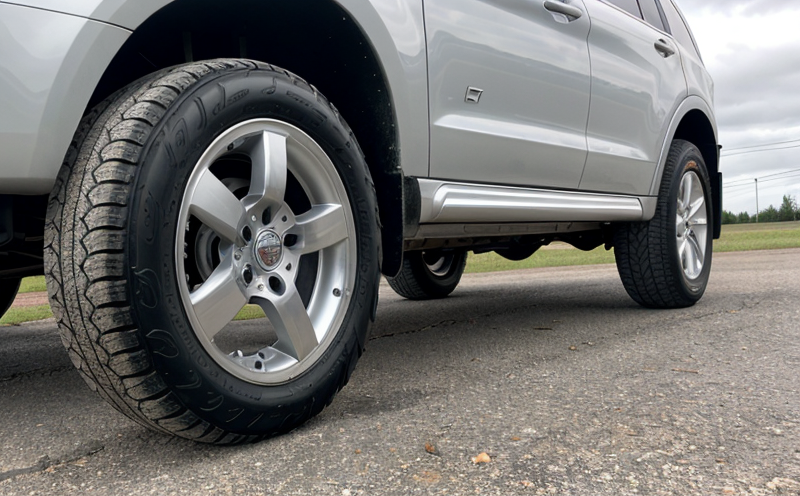EN 13979-1 Full-Scale Endurance Testing of Wheels and Axles
The EN 13979-1 full-scale endurance test is a critical procedure for ensuring the reliability and safety of railway wheels and axles. This test, which is part of European Standard EN 13979:2016, evaluates the fatigue strength and durability of wheel sets under realistic operating conditions. It is essential for manufacturers to demonstrate that their products can withstand the harsh environments and rigorous operational demands they will face in service.
The test involves subjecting a full-scale wheel set to repeated cycles of loading until it fails or reaches its specified endurance limit, which varies depending on the intended use case (e.g., passenger trains, freight wagons). The testing apparatus replicates real-world conditions by incorporating dynamic loads and environmental factors such as temperature variations, moisture exposure, and contamination.
During this test, engineers closely monitor various parameters including stress levels within critical areas of the wheel and axle assembly. They also assess surface integrity, wear patterns, and any signs of fatigue crack initiation or propagation. The data collected during these tests helps manufacturers identify potential weaknesses early on so they can address them through design improvements before products enter production.
One key aspect of EN 13979-1 testing is the use of specialized equipment that simulates actual service conditions as closely as possible. This includes precise control over load application, speed variations, and environmental exposures like humidity and temperature swings. The accuracy and precision of this equipment are crucial for obtaining reliable results, which in turn enables accurate assessments of product performance.
Another important factor is the preparation of test specimens according to strict specifications outlined in EN 13979-1. This ensures that all samples being tested are representative of typical production runs and minimize variability between different batches or suppliers. Proper specimen preparation also helps ensure consistent results across multiple tests, enhancing confidence in the outcomes.
After completing the test cycle, comprehensive analysis is conducted on both passed and failed specimens to determine whether they meet all specified criteria for acceptance per EN 13979-1 requirements. Any non-conforming items are thoroughly investigated to understand root causes so that necessary corrective actions can be taken.
- Repeatability: Ensures consistent results across multiple tests
- Accuracy: Accurate measurement of critical parameters during testing
- Compliance: Adherence to all relevant international standards and regulations
The importance of EN 13979-1 cannot be overstated for maintaining high safety standards in the railway industry. By rigorously evaluating wheel sets through this standardized procedure, manufacturers can ensure their products are capable of performing reliably under demanding operational conditions.
Why Choose This Test
Selecting EN 13979-1 full-scale endurance testing is advantageous for several reasons. Firstly, it provides a robust methodology for assessing the fatigue strength and durability of railway wheels and axles under realistic operational conditions. Secondly, this test helps identify potential weaknesses early in the development process, allowing manufacturers to make necessary improvements before production begins.
Thirdly, compliance with EN 13979-1 ensures that products meet stringent regulatory requirements, thereby reducing the risk of product recalls or safety issues once they enter service. Fourthly, by using this standardized procedure, companies can demonstrate their commitment to quality and reliability, which is increasingly important in today’s competitive market.
Fifthly, EN 13979-1 testing offers valuable insights into how different materials and designs perform under various conditions, enabling continuous improvement of products. Lastly, the data gathered from these tests can be used to inform design decisions for future generations of wheel sets, ensuring they are even more robust and reliable.
Quality and Reliability Assurance
- Data Accuracy: Precise measurement of critical parameters during testing
- Reproducibility: Consistent results across multiple tests
- Compliance: Adherence to all relevant international standards and regulations
The EN 13979-1 full-scale endurance test is instrumental in maintaining high quality and reliability within the railway industry. By ensuring accurate data collection, consistent results across multiple tests, and strict adherence to international standards, this test helps manufacturers maintain a strong reputation for producing safe and dependable products.
Environmental and Sustainability Contributions
The EN 13979-1 full-scale endurance test plays a crucial role in promoting sustainability within the railway industry. By ensuring that wheels and axles are capable of performing reliably under demanding operational conditions, this test helps reduce maintenance costs and extend the service life of components, thus minimizing waste.
Moreover, by identifying potential weaknesses early through rigorous testing, manufacturers can implement design improvements that enhance overall efficiency without compromising safety. This leads to more efficient use of resources throughout the product lifecycle, from manufacturing to disposal.





